Archived Blog Posts
Top 5 Signs of a Faulty Fire Sprinkler System
8/14/2023 (Permalink)
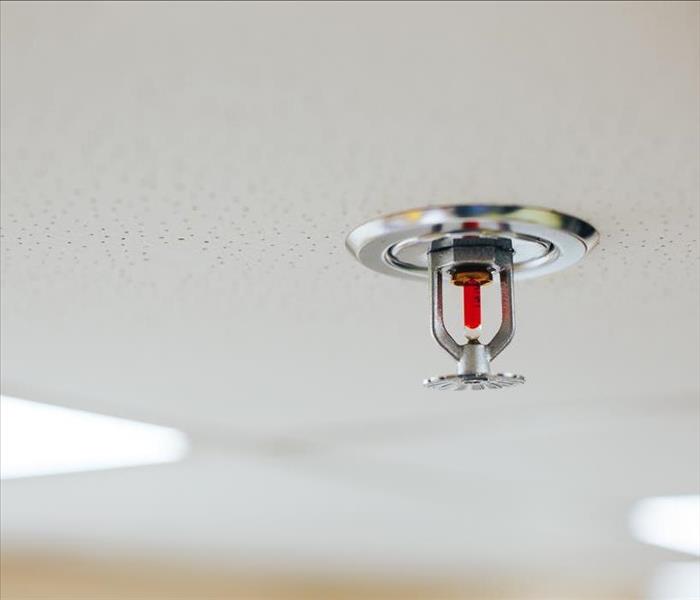 Like any mechanical system, fire sprinklers can experience faults and malfunctions over time.
Like any mechanical system, fire sprinklers can experience faults and malfunctions over time.
When it comes to safeguarding your home and loved ones, a properly functioning fire sprinkler system plays a crucial role. However, like any mechanical system, fire sprinklers can experience faults and malfunctions over time, potentially compromising their effectiveness in the event of a fire. In this article, we will explore the signs that indicate a faulty fire sprinkler system. By being aware of these signs and taking proactive measures, you can ensure that your home's fire protection system is always ready to act when it matters most.
Inadequate water pressure or flow
One of the primary indicators of a faulty fire sprinkler system is inadequate water pressure or flow. If you notice a decrease in water pressure throughout your home or experience weak water flow from faucets and showers, it may indicate an issue with the sprinkler system. Insufficient pressure or flow can impair the sprinklers' ability to effectively extinguish a fire, putting your property at risk.
Leaks or visible signs of corrosion
Regularly inspect your fire sprinkler system for leaks or signs of corrosion. Leaking water around sprinkler heads, pipes, or fittings can be a clear indication of a problem. Corrosion, often characterized by rust or discoloration, weakens the system's structural integrity and can lead to leaks or even pipe bursts. Any signs of leakage or corrosion should be promptly addressed by a qualified professional.
Obstructed sprinkler heads
A key aspect of maintaining a functional fire sprinkler system is ensuring that sprinkler heads remain unobstructed. Over time, dust, debris, or accidental damage can obstruct or block the sprinkler heads, rendering them ineffective during a fire emergency. Regularly check the sprinkler heads to ensure they are free from any obstructions. If you notice anything blocking or impairing their coverage, contact a professional to address the issue promptly.
Alarms or control panel malfunctions
Your fire sprinkler system is typically integrated with an alarm and control panel. Malfunctions in these components can be a sign of a faulty system. Pay attention to any false alarms, failure to activate during testing, or issues with the control panel display. These could indicate electrical problems, faulty wiring, or sensor failures, all of which require immediate attention from a trained technician.
Outdated or inadequate system design
If your fire sprinkler system was installed many years ago or does not comply with current building codes and standards, it may be considered outdated or inadequate. Technological advancements in fire safety have led to more efficient sprinkler systems with enhanced features. If you suspect your system is outdated, it's advisable to consult with a professional to assess its effectiveness and consider upgrading to a more advanced system.
Recognizing the signs of a faulty fire sprinkler system is essential for maintaining the safety of your home and property. Regular inspections, prompt repairs, and necessary system upgrades are vital to ensure that your fire sprinklers are fully functional when you need them most. If you notice any of the signs discussed in this article, don't hesitate to seek professional assistance. By staying vigilant and proactive, you can have peace of mind, knowing that your fire sprinkler system is reliable and capable of protecting your home and loved ones in the event of a fire.
How to Be Proactive About Plumbing Issues
7/18/2023 (Permalink)
Plumbing issues can quickly escalate into costly disasters, causing extensive damage to your home and disrupting your daily life. However, by taking a proactive approach and implementing preventative measures, you can significantly reduce the risk of plumbing emergencies and ensure the smooth functioning of your plumbing system. In this blog post, we will explore several proactive steps you can take to safeguard your home from plumbing issues and save yourself from unnecessary stress and expenses.
Regularly Inspect Your Plumbing System
Performing routine inspections of your plumbing system is crucial for the early detection of potential issues. Check for leaks, corrosion, or any signs of water damage in exposed pipes, faucets, and fixtures. Addressing these minor problems promptly can prevent them from evolving into major issues.
Maintain Proper Drainage
Clogged drains are a common plumbing problem that can lead to backups and overflowing water. Avoid pouring grease, food scraps, or other debris down the drains, and use drain guards or strainers to catch hair and other particles. Regularly clean your drains using natural remedies or eco-friendly drain cleaners to prevent buildup.
Monitor Water Pressure
Excessive water pressure can strain your pipes and cause leaks or bursts. Install a pressure regulator to maintain the water pressure within the recommended range (typically between 40-80 psi). Regularly check the pressure and adjust it if necessary to protect your plumbing system.
Insulate Exposed Pipes
In colder climates, exposed pipes are vulnerable to freezing and bursting. Insulate these pipes with foam sleeves or heating tape to prevent them from freezing during winter. This simple step can save you from the hassle and expense of dealing with burst pipes and subsequent water damage.
Prevent Water Heater Issues
Regularly inspect and flush your water heater to remove sediment buildup, which can affect its efficiency and lifespan. Set the temperature to the manufacturer's recommended setting to prevent scalding and minimize the risk of overheating or tank failure.
Educate Household Members
Educate everyone in your household about water-saving practices and responsible plumbing habits. Encourage them to report any plumbing issues immediately to prevent them from worsening. Teach them how to shut off the main water valve in case of emergencies.
By implementing these proactive measures, you can minimize the chances of plumbing disasters and protect your home from water damage. However, if you do encounter a plumbing issue despite your best efforts, don't hesitate to contact a professional plumber or a reputable disaster restoration company like SERVPRO of Williamsport/Montoursville. Our experienced team is available to provide timely assistance and expert solutions to mitigate the damage and restore your home to its preloss condition.
Remember, being proactive about plumbing issues is not only cost-effective but also brings peace of mind, knowing that you have taken the necessary steps to safeguard your home and prevent potential disasters.
When the Lights Go Out: Your Options for Dealing with a Power Outage After a Storm
6/8/2023 (Permalink)
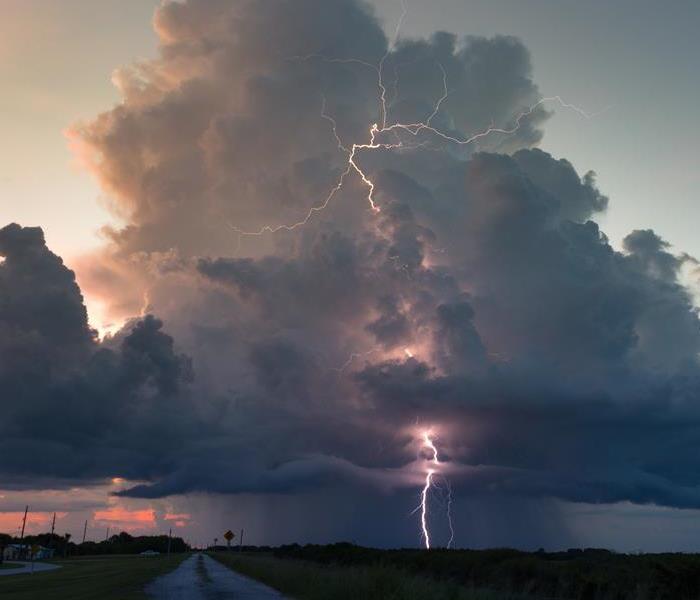 Power outages could occur after a storm or severe weather event.
Power outages could occur after a storm or severe weather event.
Power outages are a common occurrence after a storm or severe weather event. These outages can last for several hours or even days, leaving you without access to essential resources such as light, heat, and food. Knowing your options during a power outage can help you stay safe and comfortable until the power is restored.
Here are some of the options you have if the power goes out after a storm:
Use a generator
A generator can provide you with electricity during a power outage. Generators come in various sizes and types, and can power anything from a single appliance to your entire home. However, it's important to follow safety precautions when using a generator, such as keeping it outside and away from open windows and doors.
Use a battery-powered backup
A battery-powered backup is an excellent option for powering small devices, such as cell phones, laptops, and flashlights. These backups can be recharged using a solar panel or a car charger, making them a convenient and sustainable option.
Use a gas-powered stove
If you have a gas-powered stove, you can still cook and prepare meals during a power outage. Just make sure to keep a window or door open for ventilation.
Use alternative lighting sources
Candles, oil lamps, and battery-powered lights can provide you with lighting during a power outage. Make sure to keep these sources away from flammable objects and never leave them unattended.
Stay warm
If it's cold outside, staying warm during a power outage is essential. Bundle up with warm clothing and blankets, and consider using a gas-powered heater or a wood-burning stove to stay warm.
Preserve food
If you have a refrigerator or freezer, try to keep the doors closed as much as possible during a power outage to help preserve food. If the outage is expected to last for more than a day, consider using a cooler with ice to keep perishable items cold.
Stay informed
Keep a battery-powered radio or portable charger on hand to stay informed about the latest news and updates on the power outage. This can help you make informed decisions about your safety and well-being.
In conclusion, power outages can be a frustrating and inconvenient experience, but knowing your options can help you stay safe and comfortable until the power is restored. Whether you use a generator, battery-powered backup, or alternative sources of lighting and heat, always prioritize safety and follow the manufacturer's instructions for proper use.
The Science Behind Mold Odors: What Does Mold Smell Like?
5/15/2023 (Permalink)
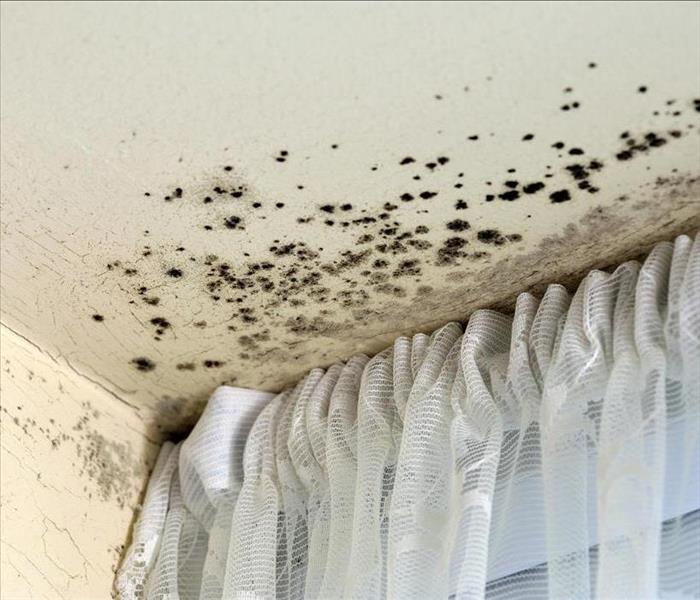 By understanding the science behind mold odors and taking steps to prevent mold growth, you can keep your home smelling fresh and clean.
By understanding the science behind mold odors and taking steps to prevent mold growth, you can keep your home smelling fresh and clean.
Mold is a common problem in homes and buildings, and it is often accompanied by a distinctive odor. But why does mold have an odor, and what does it smell like? In this blog, we will explore the science behind mold odors and provide some insight into what to expect when dealing with mold growth in your home.
Understanding Mold Growth
Before we can understand why mold has an odor, it is important to understand what mold is and how it grows. Mold is a type of fungus that thrives in warm, damp environments. It can grow on a variety of surfaces, including walls, ceilings, floors, and even furniture. Mold can cause serious damage to your home if left untreated, including structural damage, unsightly stains, and unpleasant odors.
The Science Behind Mold Odors
Mold odors are caused by a combination of volatile organic compounds (VOCs) and microbial volatile organic compounds (MVOCs). VOCs are chemicals that are released into the air by mold as it grows, while MVOCs are chemicals that are produced by the mold itself. These compounds are responsible for the characteristic musty, earthy odor that is often associated with mold growth.
What Does Mold Smell Like?
The exact smell of mold can vary depending on the type of mold and the specific conditions in which it is growing. However, mold odors are generally described as musty, earthy, or damp. Some people also report a sour or pungent smell when dealing with mold growth.
Why Does Mold Smell Bad?
Mold odors are often considered unpleasant or offensive, but why do they smell bad? The answer lies in our sense of smell. Our brains are wired to associate certain smells with danger or decay, which is why we often find the smell of mold to be unpleasant. Additionally, mold odors can be an indication of a larger problem, such as water damage or poor indoor air quality, which can further contribute to their unpleasant nature.
Identifying Mold Odors in Your Home
If you suspect that you have mold growth in your home, one of the first signs may be a musty or earthy odor. Other signs of mold growth may include visible mold on surfaces, water stains or discoloration, or an increase in allergy or asthma symptoms. If you notice any of these signs, it is important to take action as soon as possible to prevent further damage and potential health issues.
Preventing Mold Growth and Odors
The best way to prevent mold growth and odors is to control the moisture levels in your home. This means fixing any leaks or water damage immediately, using a dehumidifier in damp areas, and ensuring that your home is well-ventilated. It is also important to clean up any spills or moisture promptly to prevent mold from growing.
In conclusion, mold odors are caused by a combination of VOCs and MVOCs, which are released by mold as it grows. These odors can be unpleasant and may be an indication of a larger problem, such as water damage or poor indoor air quality. By understanding the science behind mold odors and taking steps to prevent mold growth, you can keep your home smelling fresh and clean.
Creating and Practicing a Fire Home Escape Plan: Steps to Keep Your Family Safe
4/14/2023 (Permalink)
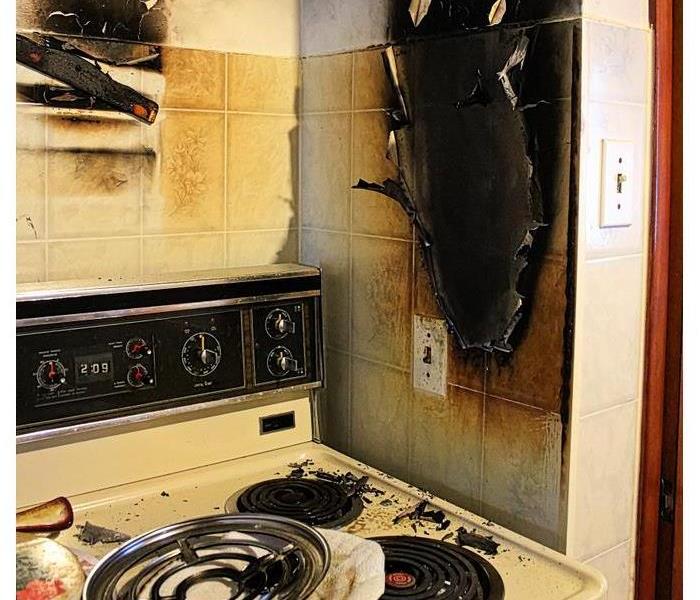 By following these steps, you can be better prepared for an emergency situation and keep your family safe.
By following these steps, you can be better prepared for an emergency situation and keep your family safe.
A home fire can be a terrifying and life-threatening event, with little time to react and escape. That's why it's crucial to have and practice a home fire escape plan. A fire can happen at any time, and having a plan in place can mean the difference between life and death. Here are some reasons why it's important to have and practice a home fire escape plan.
Time is of the essence
In the event of a fire, every second counts. Having a fire escape plan in place can help you act quickly and efficiently, reducing the risk of injury or death. A well-practiced plan can help you navigate your home and get out safely.
Fire can spread quickly
Fires can spread rapidly, making it difficult to escape. Having a plan in place that includes multiple escape routes can help you get out of your home quickly and safely. It's essential to know all possible exits and to have a designated meeting place outside of your home.
Smoke can be deadly
In many cases, smoke inhalation is the leading cause of death in a fire. Smoke can quickly fill a room, making it difficult to see and breathe. Having a fire escape plan that includes crawling low to the ground can help you avoid smoke and get out safely.
Children and elderly
Children and elderly family members may need extra assistance in the event of a fire. Having a fire escape plan in place that takes into account any special needs can help everyone in your household get out safely.
Peace of mind
Knowing that you have a plan in place can provide peace of mind and help reduce anxiety. Practicing your plan regularly can also help build confidence in your ability to react calmly and quickly in an emergency.
Creating an Escape Plan
A fire home escape plan is a detailed plan that outlines the steps you and your family members should take in the event of a fire. It is important to have an escape plan in place because when a fire occurs, time is of the essence and every second counts. Below are some steps to help you create and practice your fire home escape plan.
Step 1: Draw a Map of Your Home
The first step in creating a fire home escape plan is to draw a map of your home. This map should include all the rooms in your home, including the windows and doors. Make sure to mark two ways out of each room, including which windows and doors to use.
Step 2: Determine a Meeting Place
The next step is to determine a meeting place for your family members. This should be a safe location outside of your home, such as a neighbor's house or a designated location in your yard. Make sure everyone knows where the meeting place is.
Step 3: Install Smoke Detectors
Install smoke detectors throughout your home, making sure to place them on every level of your home and inside each bedroom. Test them regularly and replace the batteries twice a year.
Step 4: Practice Your Plan
Practice your fire home escape plan with your family members. Have everyone go through the steps of the plan, including getting out of the house and meeting at the designated location. Practice different scenarios, such as a fire starting in a different room or in the middle of the night.
Step 5: Review and Update Your Plan
Review and update your fire home escape plan regularly. Make sure everyone is aware of any changes and that the plan is still relevant for your home and family.
In conclusion, having a fire home escape plan is crucial for the safety of you and your family members. A well-thought-out plan can save lives and reduce the chances of injury. Remember to draw a map of your home, determine a meeting place, install smoke detectors, practice your plan regularly, and review and update your plan. By following these steps, you can be better prepared for an emergency situation and keep your family safe.
5 Common Causes of Commercial Water Damage
3/12/2023 (Permalink)
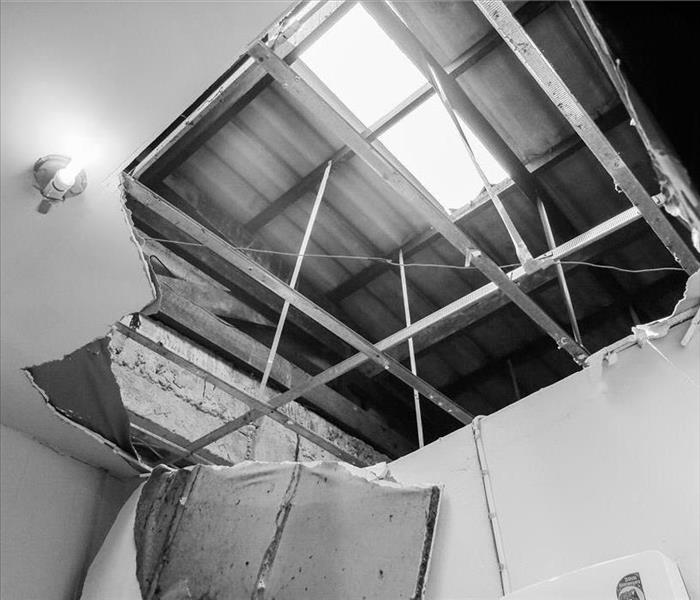 If you're looking for more information about how we can help with commercial water damage in your area, contact us today!
If you're looking for more information about how we can help with commercial water damage in your area, contact us today!
Water damage can happen in any building, whether it's a home or an office. It could be a burst pipe or an overflowing sink that causes the problem, but regardless of what the source is, water damage can be costly to fix and disruptive to business operations. If you're looking for ways to minimize the impact of commercial water damage on your company, here are some common causes:
HVAC Units
If you're in the commercial real estate business, then you know that HVAC units are a common cause of water damage. This is because they can leak and flood. They can also cause mold growth if they're not properly maintained or cleaned out regularly.
If your HVAC unit isn't functioning properly, this will lead to higher utility bills--and if it's damaged beyond repair, it could result in structural damage as well!
Sprinklers
Sprinkler systems are a common source of water damage. They often go unnoticed until there is damage, as they are found in high-rise buildings and commercial buildings. Sprinklers can cause water damage in the following ways:
- The sprinkler system is activated by itself or accidentally by someone else. This can happen if someone trips over a hose, for example.
- The sprinkler system malfunctions in some way and begins to leak.
Water Heaters
Water heaters are a common source of water damage in commercial buildings. Water heaters can leak from the top or bottom of the tank, as well as from any one of several valves on both sides of the appliance. Leaks from these areas can lead to wet floors or even flooding if left unchecked.
Plumbing Issues
A plumbing issue can cause a lot of damage to your property. If you have a water leak in the piping, it can cause mold and mildew to grow on your walls and floors. There are many reasons why plumbing problems occur: clogs, frozen pipes, burst pipes - even if they're not obvious at first glance and they occur very frequently, especially in older properties.
Roof Leaks
You might think that you know the cause of a roof leak, but it can be difficult to diagnose. Roof leaks can be caused by everything from defective flashing around the chimney or skylights to defective roofing membranes and even improper installation techniques.
Roof leaks can cause significant damage. It is important to have a professional routinely inspect your roofing to ensure that there are no flaws or risks with your roofing.
Water damage is a serious issue, but it's important to remember that there are things you can do to protect yourself from these types of incidents. If you're looking for more information about how we can help with commercial water damage in your area, contact us today!
Step-by-step Guide to the Fire Restoration Process
2/15/2023 (Permalink)
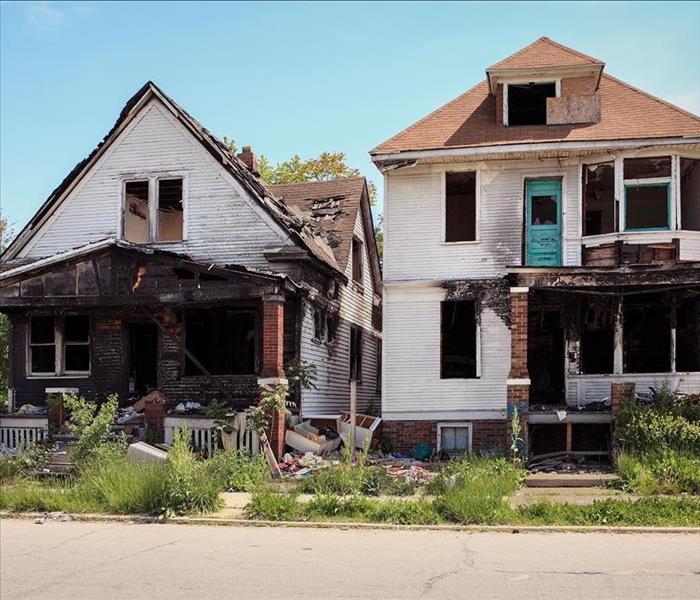 With professional help, it's possible to get your home back on track in no time at all after a fire.
With professional help, it's possible to get your home back on track in no time at all after a fire.
A fire is one of the most devastating things that can happen to a homeowner. It can completely destroy your property and even lead to life-threatening situations. However, with professional help and a well-executed fire restoration process, it's possible to get your home back on track in no time at all. Here's what the average fire restoration process looks like.
Call the Experts
Once the flames have been put out, the first step in the fire restoration process is to call in the experts. A qualified professional will assess the damage, determine how much damage has been done and give you an estimate of what it will cost to fix it. They'll also make sure that their equipment is up to snuff and that they have the manpower necessary to tackle the job.
Contact Your Insurance Company
Next, it's time to contact your insurance company. Give them all the necessary information about your claim and ask for a copy of your policy so that you can review it later. Your restoration company will also handle this process for you if they are involved with restoring damaged property. They also know how to handle insurance claims and will work with your insurance company through the claim so that you can get paid as quickly as possible without having any problems along the way.
Water Extraction
Water extraction is the removal of water from a property. The accumulation of water can be due to fire suppression systems or firefighting efforts.
Water removal is the first step of the actual mitigation and restoration process as it is one of the most important steps. Removing the moisture as quickly as possible after a loss is important in order to avoid further, unnecessary damage to your property. The equipment used for this process varies depending on the size of your home and how long it's been since the fire occurred.
Debris Removal
After the fire, your property will be filled with debris. This includes:
- All damaged materials and furniture
- All damaged walls and ceilings
- All damaged insulation
- Any destroyed or damaged appliances
- Any personal property that has been damaged, such as clothing, jewelry, and electronics
Soot and Smoke Removal
Soot and smoke removal is the next step of fire restoration. This process removes soot and smoke stains from walls, ceilings, floors, and other surfaces. Soot removal can be accomplished by using specialized equipment to remove any soot and smoke that may still be present in your home.
If you have experienced a fire in your home or business building it is important to make sure that all areas are completely cleaned before moving forward with any repairs or reconstruction work. It's also important to note that professional cleaning services should always be used when performing this type of work because they will ensure proper results while reducing the risk of spreading contaminants throughout other rooms in your house or office building.
Restoration
Restoration is the process of making your property look like it did before the fire. Restoration is the most important part of the fire restoration process and will take place after the mitigation has been completed. If you are unsure about what to do next in restoring your home, we would be happy to help!
This step can take anywhere from several weeks up to several months depending on how extensive repairs were needed.
A well-executed fire restoration process can help get your property back to normal. It is important to know what to expect from this process and how long it will take before repairing your home or business after a fire. The steps we outlined above should give you a better idea of what goes into restoring damaged property after an incident like this one occurs. We hope this guide has been helpful for those who are looking for information about the fire restoration process!
Getting Your House Ready for a Hurricane
1/10/2023 (Permalink)
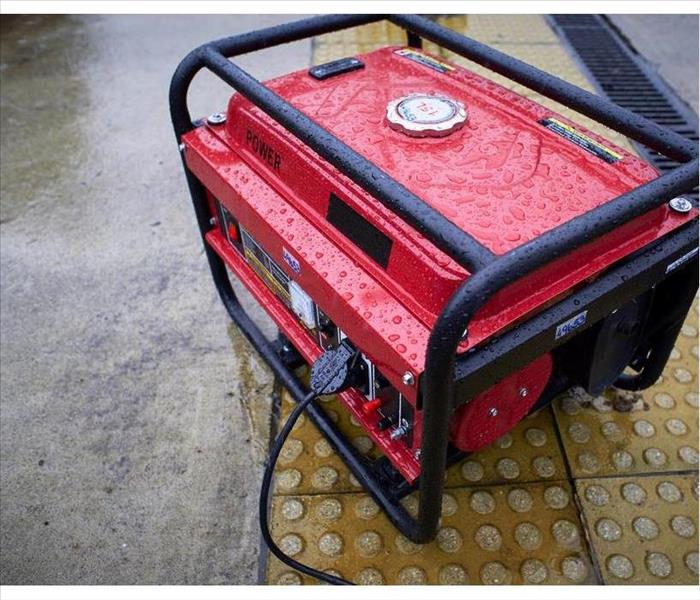 Install and maintain a generator
Install and maintain a generator
Preparing for Hurricanes
A hurricane can hit your home at any time, so you need to be prepared for it. Here are some things you should do before the storm hits:
Protect and Clear Gutters
Leaves and other debris can accumulate in your gutters, blocking the flow of water that's supposed to get rid of it. If this happens, you may end up with leaks around your house and even flooding on the ground floor. Remove any obstructions from your gutters so they can do their job properly! If you have a gutter guard installed, make sure it is secure so water doesn't get trapped behind it. Consider installing one if you don't already have one—it's an easy way to keep your gutter clean without having to climb up onto a ladder every time something falls into them!
You should also secure loose rain gutters or extensions with brackets. If you don't have enough brackets, you can use plastic zip ties to secure your rain gutters. Fasten brackets to the fascia board (the board that runs across the top of your exterior wall). Secure both ends of the gutter strap over each bracket's screw hole and then tighten down each screw.
Install Storm Shutters
The first step to protecting your home from hurricane-force winds is to install storm shutters on all windows. When shopping for storm shutters, you'll find that there are two kinds: permanent and removable. Permanent storm shutters are installed by professional contractors and should last for as long as your home does. They're made with strong materials like metal or plastic, which makes them more expensive but also more durable than their removable counterparts.
You can install removable storm shutters yourself if you have the time and energy (or money). This type of shutter usually attaches to the window frame with screws, but some come with adhesive strips or suction cups instead. If you choose this option, make sure that the instructions are clear; otherwise, it's easy to accidentally damage both windows and frames when installing your temporary protection against hurricanes!
Install a Generator
One of the most important things you can do to make sure your home is ready for a hurricane is to install and maintain a generator. A generator will keep your refrigerator and freezer running, as well as power lights and other appliances that are essential during an outage.
If you don't have a permanent generator installed at home or work yet, now is the time to look into getting one. Generators should be tested every month with fuel added as needed so they will start immediately when needed during an emergency situation or power outage.
Protect your Garage Door
Garage doors are particularly vulnerable to high winds because they're large, heavy, and often double-sliding. The best way to secure your garage door is to brace it against the frame, using a length of lumber at least 2 feet long and 1 inch thick. If you have a chain or rope available, tie it around the door track above the garage door’s top hinge so that it can't be lifted out of its tracks by strong winds blowing into the garage.
Sandbags are commonly used for flood protection, but they can also be used to protect your garage door. The sandbags should be placed on the exterior of your garage door so that if water comes in from a hurricane it will flow around the sandbags and not directly into your home. To do this, place several bags along the perimeter of your garage door so that they form a barrier between it and the house. The bags should be filled with either soil or sand (not concrete) and stacked two high, with no gap between them and the garage door.
Inspect your Roof
It's probably a good idea to inspect your roof before the storm arrives, so you know what to look for when it does.
Check for loose shingles or tiles. Loose shingles are easy to spot, but if you don't have time to climb up onto your roof and check for them, look for any signs of water damage on the outside of your house (e.g., brown spots that could indicate leaking from a bad roof).
Check for damage to the roof—especially around pipes and chimneys. If you see any signs of damage like cracks in flashing or missing shingles, call experts in roof repairs immediately!
Check for damage to gutters and downspouts—more important than it might seem at first glance because they're designed with angles that allow rainwater runoff away from your home when there's no wind pushing against them (which means less risk of flooding).
Trim Trees
If you have a large tree that's close to your house, trim it back. Make sure there's plenty of clearance around all power lines and stakes, and never cut branches that are too close to power lines. If you're not sure how to trim a tree safely, consider hiring a professional arborist or landscaper.
Cover the air conditioning system.
To protect your air conditioning system, cover the entire unit with plywood and seal it with tape or plastic wrap. This will not only protect your system from wind-driven rain or wind-blown debris but also keep it from being damaged by water that may come in contact with the AC condenser coils.
There are certain steps that you can take to prepare your home, and yourself, for hurricane season. These tips will help you get ready in case of an emergency. With these steps, you can make sure that your home is ready for hurricane season. Remember to keep an eye on the weather and stay safe! If a storm is coming your way, don’t forget to take proper precautions so you can ride out the storm safely in your own home.
If you do experience damage to your home after a hurricane, give SERVPRO of Williamsport/Montoursville a call! We will get your Williamsport home back to normal quickly!
Preparing Your Business For a Snow Storm
12/5/2022 (Permalink)
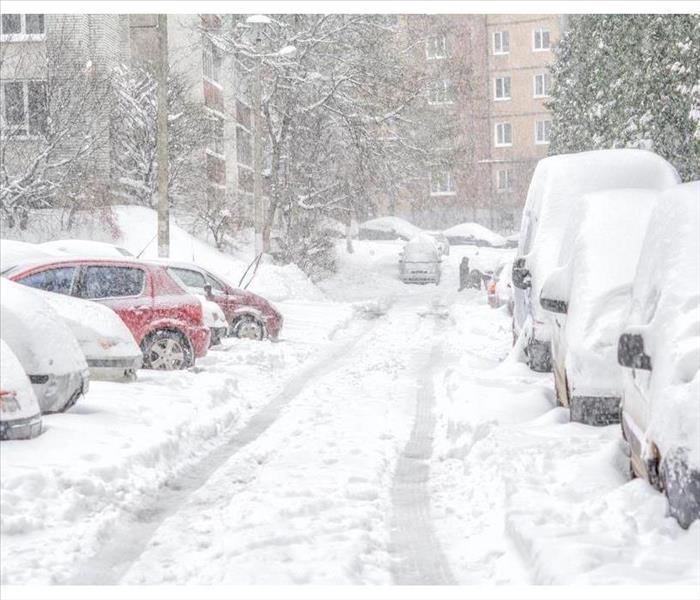 Get your business ready for a snowstorm.
Get your business ready for a snowstorm.
Protect Your Business and Employees from a Snow Storm
The winter months can be a challenging time for your business, but the risks of damage and potential loss can be minimized with some preparation. There's no such thing as a typical snowstorm, but there are steps you should take to protect your business and employees before they start falling.
Create an Emergency Plan
The first step in preparing your business for a snowstorm is to create an emergency plan and make sure that all of your employees know about it. You should also have a plan for where to go if you are stranded, how to communicate with employees and customers, what to do if the building floods, and how you will get supplies.
Establish a Communication Plan
Make sure everyone knows what to do if they can't get to work, or if they can't get home. Use text messages, email, and social media to keep in touch with your employees and customers and let them know how the storm is affecting business. This is often the best time for people to check their voicemail anyway—so make sure you have an automatic message set up explaining why you're not answering the phone right now.
Assign Responsibilities
When creating an emergency plan for your business, be sure that everyone knows what their role will be during an extreme weather event. In addition, assign someone who has access to the Internet or other resources so that they can find out about any updates in case power goes out or roads become impassable. Here are some other responsibilities to consider:
- Who will be responsible for communication? Perhaps you've already prepared a plan for how your team will communicate with one another during the storm, but it's important to review this plan again before the snow starts falling. Make sure everyone knows what their role is and how they should respond during an emergency situation.
- Who will be responsible for supplies? You may have an established list of items that need to be stocked up on before severe weather hits, and those items should still be available if there's a blizzard in your area, but extra things may need purchasing as well. This might include food, batteries or flashlights, heavy blankets, water bottles, and more. The list varies depending on your industry (and whether your employees are working remotely).
Identify an Alternate Location, If Necessary
The next step is to plan for your business to be closed. If you have a backup location, identify it and make sure it is ready to receive customers. If not, consider having employees work from home on days when the office will be open late or closed completely.
If you’ve decided that your office will be partially open or fully open during the storm, have a plan in place for anyone who needs transportation between locations (if applicable).
Consider Safety for Community and Employees
You should keep your employees updated on the latest information about weather conditions, including whether or not you will be closing early, so they can plan accordingly. If you have staff who work from home, make sure they have access to the internet and electricity if needed. It's also a good idea to provide food and water for your staff in case power outages occur during the storm that prevents them from driving somewhere else for supplies. Prepare for road closures if necessary by stocking up on cleaning supplies such as shovels, brooms, trash bags, and mops for when you reopen after clearing off any ice or snow from sidewalks outside your business premises (if applicable).
Take Inventory
Getting your business ready for a snowstorm is a matter of preparing supplies, equipment, and emergency procedures.
Prepare Insurance Policies
Take inventory of your insurance policies and make sure they are up-to-date. If you have employees or depend on others to work in your business, check their health insurance plan as well.
Prepare Supplies and Equipment
Stock up on all the supplies that might be needed during the storm such as food, water, and drinks for employees who will be working at home or in other locations away from the office building during a storm.
We hope these tips help you prepare for the next snowstorm. Remember that there is no one right way to handle a storm, so use your own judgment and take care of yourself! The most important thing is to have everything ready before it hits so you don’t have to worry about anything else once it does hit.
If you experience storm damage from a snowstorm in your Muncy, PA business, give SERVPRO of Williamsport/Montoursville a call.
Is Homeowners Insurance Coverage for Burst Pipes?
11/8/2022 (Permalink)
 It's important to know if your homeowners’ insurance will cover the damage.
It's important to know if your homeowners’ insurance will cover the damage.
Homeowners Insurance and Burst Pipes
When it comes to frozen and burst pipes, you want to know that your home insurance policy will protect you from costly damage. However, not all policies cover the same things. To help you navigate what is and isn't included in your plan, we've put together this guide.
Frozen and Burst Pipe Insurance Coverage
In the winter, frozen and burst pipes can occur. If you have a pipe that bursts, it's important to know if your homeowners’ insurance will cover the damage. In many cases, it does—but it's not always clear what exactly qualifies as a "burst" pipe. Many people assume their homeowners’ policy should cover this type of damage but aren't sure what kinds of pipes are covered or whether there are any limitations on how much coverage they'll receive.
Preventing a Frozen Pipe
As with all things related to your home and belongings, prevention is key when preventing frozen pipes—and there are some simple steps you can take:
- Make sure that all exterior faucets are turned off during freezing temperatures so they don't freeze up (or use anti-freeze products).
- Be sure to check outdoor spigots regularly during cold weather months; never leave them unattended while in use!
- Also, keep outdoor spigots cleaner than indoor ones so they don’t clog up from dirt buildup over time (which also causes blockages).
- Insulate any exposed pipes in crawl spaces under houses.
Water Damage Insurance Coverage
Under the Water Damage section of your policy, you will find that your insurer covers water damage from burst pipes. A burst pipe is defined as a break in any part of the pipe system that transports water to or from a building.
If a pipe breaks, causing flooding and/or damage to property within your home or building, this is considered a covered claim under this section.
Examples of covered claims include burst water pipes (including frozen) Leaking toilets, overflowing bathtubs or sinks, and damaged sump pumps.
In addition to covering damage resulting from burst pipes and leaks, your policy also provides coverage for things like sewer backups and flooding if it happens outside (for example if there’s heavy rain).
Reasons for Frozen Pipes
There are several causes of frozen pipes. The first is that the water in your home may have been turned off, which will cause the pipes to freeze and burst. This can happen if you have a leaky faucet or toilet, and you forget to fix it. Another cause could be if there's a power outage in your neighborhood, causing all appliances that use electricity—including heaters and water heaters—to stop working.
If you've experienced any of these situations, it's important to act quickly to prevent damage from occurring further down the line. If you suspect that your pipes are frozen but aren't certain whether there's been any internal damage yet, make sure they're not leaking before calling an emergency plumber out so they can assess whether or not there's any risk involved in turning them back on again (e.g., electrical hazards). It's also vital that homeowners know what kind of coverage they have before making any repairs themselves. Identifying what type of plan works best for their needs will help protect them against future expenses related to damages caused by frozen pipes during winter months when temperatures drop significantly outside.
When it comes to frozen and burst pipes, insurance companies may have different policies on what is covered by your policy. It’s important to know what is and isn't covered so that you can plan ahead for an emergency. If you aren’t sure, call your insurance company and find out.
When a pipe bursts in your home or business, give SERVPRO of Williamsport/Montoursville a call! We will be quick to mitigate the water in your home, and get your Muncy property back to normal.
How do You Estimate a Fire Damage?
10/11/2022 (Permalink)
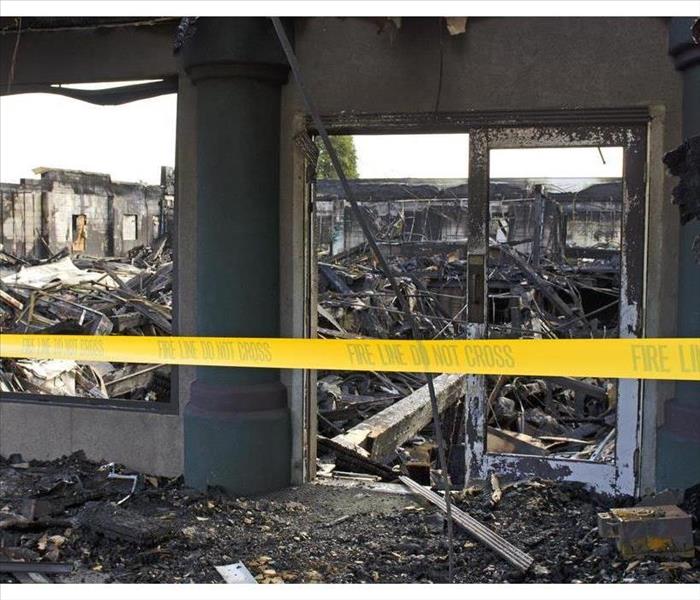 We understand how devastating a commercial fire can be to your business.
We understand how devastating a commercial fire can be to your business.
Estimating Fire Damage
The first step in estimating fire damage is to take a look at the affected area and determine what kind of damage has been done. This involves looking at the structure itself and the contents within, including any furniture or equipment that might have been damaged by smoke or water. It also involves making sure that there is no hidden damage (such as mold growth) that can't be seen at first glance but could become visible later on down the line.
Scope of Damage
The first thing we need to do is determine the scope of the damage. Is it contained, or did the flames spread throughout the building? We will look at specific areas of the damaged property. During this step, we will determine how big the affected area is. The affected area will include the building and its contents, as well as the exterior of the building. This also includes any other areas that have been damaged by fire, such as roofs or landscaping.
If your home or business has been completely consumed by flames and burned down to its foundations, then our job will be much simpler than if only part of your home has been destroyed by a fire. In this case, we will write down all visible damages as well as any structural components that appear structurally unsound (such as cracked walls or crumbling floors).
When estimating losses after an extensive fire damage situation, remember that there may be hidden dangers lurking behind walls and under floor coverings that could cause further danger once removed from their original setting.
Assessing the Condition of the Structure
If you're assessing a building that has been damaged, it's important to evaluate whether or not the structure is salvageable. If the building can be salvaged, rebuilding will likely cost less than replacing it entirely. If not, demolition may be necessary and a new building will need to be constructed on-site.
Determining Whether to Restore or Replace
While the ability to restore your property after a fire is a huge benefit, it's not always possible. In fact, more often than not, restoration is not an option.
Before you make any decisions about which items should be restored and which should be replaced, you'll want to consider whether or not they can be restored.
Restoration is generally only recommended if the item in question has sentimental value or is important for your livelihood (for example, a guitar). If not, it may be time for some fresh air and new memories.
Call the Professionals
We understand how devastating a commercial fire can be to your business. An estimate is the first step toward recovering from the damage, but it’s also an important part of knowing what to expect and making informed decisions.
Our experienced technicians can help you get back on track after a commercial fire in your Muncy, PA business—and in some cases, they may even be able to save your property from total destruction. We know how complex this process is because we have experience with various types of fires, including electrical fires (which are surprisingly common), grease fires, gas explosions, and more.
When you work with us for fire damage restoration services after a disaster strikes your company or business location you will have access to our specialized knowledge base about all things related to fire damage restoration for commercial properties like yours.
At SERVPRO of Williamsport/Montoursville, we have the experience, training, and skills to help you through this difficult time. We understand that your business is more than just a building or an inventory list—it’s what keeps your family fed, clothed, and happy. That’s why we take pride in being able to restore your property back to its original state so that you can continue doing what you love most: serving customers!
How Often Should You Service Your Furnace?
8/27/2022 (Permalink)
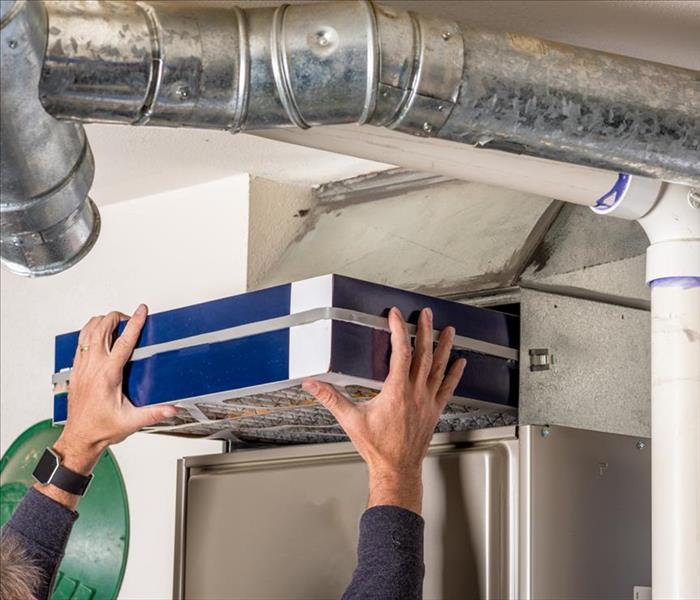 Properly service your furnace
Properly service your furnace
How Frequently Should Your Furnace Be Serviced?
When cooler weather comes in Montoursville, PA, you'll be grateful for a properly functioning furnace. However, if you neglect routine maintenance and upkeep, your furnace won't do a good job of keeping you warm. Worse, problems could arise that could lead to fires. To avoid fire cleaning and other disaster mitigation, you need to properly service your furnace.
1. Replace the Filters Regularly
Your furnace relies on an air filter to work efficiently. The filter will keep dust, dirt and other debris from getting into the appliance and hampering airflow and other performance issues. Too much buildup can also cause fires. To avoid fire cleaning and an inefficient system, make sure you replace the filters often.
2. Have an Annual Inspection
Sometimes, you can pinpoint signs that your furnace is acting up and needs some repairs. But often, problems start small and are difficult to detect unless you take a closer look at the unit. This is a job that a professional can handle. At least once a year, call a heating and air conditioning technician to inspect your furnace. This will give you peace of mind. Also, the technician can identify areas that you need to address before they get worse.
3. Act Immediately When There Are Problems
Pay attention to your furnace and indications that it may not be performing well. If the air coming out is not warm or if the airflow is weak, you need a professional to service it. Also, pay attention to odd sounds or smells coming from the unit or the vents. Don't delay in calling for help. This will allow you to avoid having to call a professional fire mitigation company for smoke cleaning.
Fire cleaning can be expensive and stressful. If you keep up with furnace maintenance, you can reduce the risk of fires and poor HVAC performance.
4 Fire Safety Tips To Keep In Mind When Grilling
8/27/2022 (Permalink)
 Remember to grill away from the HVAC intake system or your home may smell like BBQ for a long time
Remember to grill away from the HVAC intake system or your home may smell like BBQ for a long time
When Grilling, Consider These Four Fire Safety Tips
Cooking a great meal on the barbeque is a staple for many homes. However, it's important to understand how to safely operate a grill in order to avoid a home fire. Here are four essential tips to employ in your Loyalsock, PA, home to avoid a grill fire.
1. Inspect Gas Grill for Leaks
If you have a gas grill, it's important to check it before every use and make sure there is no gas leaking. Always be wary of the smell of propane gas while grilling, as this could soon turn into a dangerous grill fire.
2. Be Mindful of Proper Charcoal Grill Practices
Like gas grills, charcoal grills also require safety measures. When lighting one up, don't overuse any starter fluid. Subsequently, never add charcoal fluid or any other flammable liquids once flames have been established. Take caution after use as well and let coals cool entirely before disposing them into a metal container.
3. Place Barbeque Away From Home
Keeping your grill too close to your home is not advised. Doing so not only risks the chance of a home fire but will likely result in smoke damage on the exterior of the house. If this occurs, a fire damage restoration company will likely need to intervene to clean the smoke and repair any damage.
4. Always Clean After Cooking To Avoid a Grill Fire
More often than not, a barbeque fire will spark due to the grease and burnt residue that remains after previous use. Always scrape away this residue from the grill grates as well as the underneath tray to best avoid out-of-control flames the next time you cook.
Keep your barbequing safe from fire hazards by checking for leaks on a propane grill, knowing the best practices for a charcoal grill, cooking away from the house and always cleaning the grill after use.
How To Remove Cigarette Smoke From Your Home
8/11/2022 (Permalink)
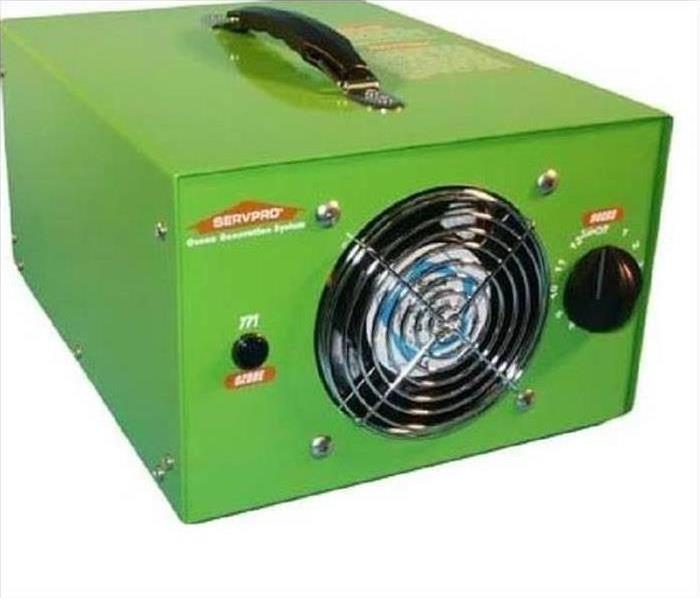 A popular method of home deodorization is ozone generation.
A popular method of home deodorization is ozone generation.
How To Get Rid Of Cigarette Smoke In Your House
If your Williamsport, PA, home has a lingering smoke smell from cigarettes, home deodorization can be tricky. Smoke particles travel far and are difficult to remove. Fortunately, there are reliable odor removal techniques. One popular option is ozone generation.
Cigarette Smoke Odor
Thirdhand smoke is when chemicals and odors from cigarettes linger in the air or on surfaces. Eliminating this entirely can be tricky because the emissions from cigarettes tend to adhere strongly to surfaces. The following are some of the many chemicals released with cigarette smoke:
- Tar
- Carbon monoxide
- Formaldehyde
- Ammonia
Many individuals find the odor of thirdhand smoke unpleasant, so getting rid of it can make your home more enjoyable for you, your family, guests and even potential buyers.
Ozone Generation
A popular method of home deodorization is ozone generation. Ozone is a reactive compound that has three molecules of oxygen. Normal ambient air has two oxygen molecules, and ozone has three. Ozone generators take normal air and apply an electrical charge to create ozone. The extra oxygen molecules created react with the smoke particles in the area to create a new compound that does not have a smokey smell. A professional restoration service knows how to properly run these machines and air out the space afterward so that occupants return to a safe, non-smoky environment.
Other Deodorization Methods
Ozone generation can be combined with other deodorization techniques to produce even better results. Scrubbing hard surfaces with a mixture of water and white vinegar removes the buildup of tar and nicotine. White vinegar can also be added to washing machines to deodorize washable fabrics.
Whether you have recently quit smoking or just moved into the former home of a smoker, getting rid of the lingering smell is likely to be difficult. Fortunately, using ozone for home deodorization has proven effective in many cases.
Do You Have Business Interruption Insurance?
4/11/2022 (Permalink)
If you own a business, you are probably aware of the importance of protecting your investment by purchasing property insurance. However, while property insurance can help you get your business running again, it doesn't pay for the income you lose while your business is inoperable. Interruption insurance can help keep your business from suffering financial distress while you wait for needed repairs. See what business interruption insurance can do for you:
- Replaces Lost Income
Depending on how severe your damage is, it could take weeks or even months to fully restore your business to preloss condition. During this business interruption, you may not be able to operate at all, or may only be able to operate at reduced capacity. This coverage replaces income lost based on your past financial records, as long as is a covered cause of loss - Helps You Pay the Bills
You will need to pay the mortgage or rent on your facility, as well as any utilities that still need to be connected when your business isn't operating Don't forget about making payments on any business loans, paying your taxes and any other business expenses. - Provides Money To Pay Employees
Your employees probably can't afford to go without a paycheck while your business is shut down due to a loss. This insurance helps you keep employees on the payroll so that you don't need to hire new employees after you reopen.
Dryer Vent Fire Prevention
4/11/2022 (Permalink)
As a homeowner or business owner, it is imperative that you are aware of, and perform, the preventative maintenances that help keep your property safe. One of the lesser known maintenances is to keep your dryer vents lint free. Here are some tips to keep your dryer working efficiently and to reduce your risk of a lint fire:
- Regular Dryer Maintenance- Make sure that you clean your dyer's lint filter after every use. Quarterly you should clean out any built-up lint where the filter is housed and as well from your dryer into your vent pipe.
- Outside Dryer Vent- Remove the cover over the access to where your dryer vent is piped outside. Check that the cover is free of debris, and clean inside the exhaust to ensure that there are no nests or lint build up.
- Pay Attention to Warnings From Your Appliance- Any unusual noises or smells, as well as longer than usual drying times, need to be handled handled by a professional repair person that is qualified for your specific appliance.
Call SERVPRO of Williamsport/Montoursville for your dryer vent cleaning today!
2022 Hurricane Seasons is Fast Approaching
4/11/2022 (Permalink)
Hurricane Safety Tips From Weather.gov
"Hurricanes are among nature's most powerful and destructive phenomena. On average, 12 tropical storms, 6 of which become hurricanes form over the Atlantic Ocean, Caribbean Sea, or Gulf of Mexico during the hurricane season which runs from June 1 to November 30 each year.
While hurricanes pose the greatest threat to life and property, tropical storms and depression also can be devastating. The primary hazards from tropical cyclones (which include tropical depressions, tropical storms, and hurricanes) are storm surge flooding, inland flooding from heavy rains, destructive winds, tornadoes, and high surf and rip currents.
- Storm surge is the abnormal rise of water generated by a storm's winds. This hazard is historically the leading cause of hurricane related deaths in the United States. Storm surge and large battering waves can result in large loss of life and cause massive destruction along the coast.
- Storm surge can travel several miles inland, especially along bays, rivers, and estuaries.
- Flooding from heavy rains is the second leading cause of fatalities from landfalling tropical cyclones. Widespread torrential rains associated with these storms often cause flooding hundreds of miles inland. This flooding can persist for several days after a storm has dissipated.
- Winds from a hurricane can destroy buildings and manufactured homes. Signs, roofing material, and other items left outside can become flying missiles during hurricanes.
- Tornadoes can accompany landfalling tropical cyclones. These tornadoes typically occur in rain bands well away from the center of the storm.
- Dangerous waves produced by a tropical cyclone's strong winds can pose a significant hazard to coastal residents and mariners. These waves can cause deadly rip currents, significant beach erosion, and damage to structures along the coastline, even when the storm is more than a 1,000 miles offshore."
See more:weather.gov
Get Your Commercial Ducts Cleaned NOW!
4/10/2022 (Permalink)
Spring is in the air- which also means it is in your ducting system! Allergens, like pollen, dander and dust particles, get sucked into your ducting system and subsequently blown around your business (or home). These contaminants also accumulate in your ducting system and cause your heating or cooling efficiency to drop as much as 25%-40%, as well as your air quality being affected. When your efficiency drops, your system has to work harder to produce the same sort of effects, which can lead to more maintenance or service repairs.
With heating season dwindling down and summer quickly approaching, now is the perfect time to get your business's ducts cleaned. Give us a call at SERVPRO of Williamsport/Montoursville at 570-546-3500. Our highly trained technicians will come take a look at your unit and ducting, give you a reasonable quote, and have your businesses air quality like new!
Storm Damage on Your Solar Panels?
4/10/2022 (Permalink)
Storms of all sizes come through Williamsport and surrounding areas during various parts of the year. Many of these storms cause little concern and do little, if any, damage to your home. However, high winds, rain, and other conditions may be a threat to the solar panels on your roof.
Hail Stones
Hail storms may not be common in your area, but they can create various problems for property owners. You may wonder about panel damage if hail starts falling, but you can have peace of mind knowing that these panels should not be affected.
The panels are made of tempered glass and highly flexible material, and are built to withstand impact from rock, hail or other materials.
Wind
While high winds can cause roof damage, they are much less likely to cause panel damage. Your solar panels are designed to withstand up to 140-mph winds. This means they can hold up against hurricanes and other less potent storms.
Snow and Rain
If you purchase a high-quality set of panels, they should last 25 years or more. They are well-equipped to handle a rainstorm or a snowstorm. The glass portion of the panels has protection from any negative effects from precipitation.
Is Clog Remover a Good Idea?
4/8/2022 (Permalink)
Sometimes our drains get clogged, and we reach for the drain cleaner, but we should be cautious of that. There are certain situations in which drain cleaner should never be used to prevent more damage from occurring.
Plastic Pipes
The chemicals in drain cleaner react together to transfer electrons to and from organic substances, causing them to break down. This process also produces heat- that's how they force their way down further into the pipe. These two factors mean that they can warp or eat through softer pipes, like plastic. The three types of cleaners you should stay away from if you do have plastic pipes are:
- Sulfiric or muriatic acid cleaners
- Lye or caustic potash cleaners
- Bleach, peroxide or nitrate cleaners
Old Pipes
Old pipes will have a lot of the same problems as plastic pipes, because they are brittle and delicate. If you discover that your pipes are old or rusting, you are probably better off replacing your plumbing rather than using a clog removing agent.
Total Blockage
Often, drain cleaners won't be able to clear a clogged drain if there is a solid mass of hair, oil or debris completely blocking the flow of air and liquid. If they are used in these situations, the cleaner ends up sitting there above the clog. Given enough time the strong chemicals may cause some real damage to your pipes.
Instead of chemical cleaner, you can try vinegar/baking soda and hot water, or biological options like a drain snake.
Clogged Dryer Vents Can Cause Fire
4/5/2022 (Permalink)
As a homeowner or business owner, it is imperative that you are aware of, and perform, the preventative maintenances that help keep your property safe. One of the lesser known maintenances is to keep your dryer vents lint free. Here are some tips to keep your dryer working efficiently and to reduce your risk of a lint fire:
- Regular Dryer Maintenance- Make sure that you clean your dyer's lint filter after every use. Quarterly you should clean out any built-up lint where the filter is housed and as well from your dryer into your vent pipe.
- Outside Dryer Vent- Remove the cover over the access to where your dryer vent is piped outside. Check that the cover is free of debris, and clean inside the exhaust to ensure that there are no nests or lint build up.
- Pay Attention to Warnings From Your Appliance- Any unusual noises or smells, as well as longer than usual drying times, need to be handled handled by a professional repair person that is qualified for your specific appliance.
Call SERVPRO of Williamsport/Montoursville for your dryer vent cleaning today!
Red Cross Fire FAQs
1/22/2022 (Permalink)
Fires in homes are one of the leading calls we get from customers this time of year. SERVPRO of Williamsport/Montoursville wants you to have this information from the Red Cross in order to hopefully prevent this from happening. See some important facts below:
When do home fires happen?
Home fires can happen at any time, but they generally increase during the fall and winter, with December and January being the peak months. Home fires are also more common on Saturday and Sunday, and tend to peak between 6:00 and 7:00 PM.
Where are home fires most likely to start?
Home fires are more likely to start in the kitchen than any other room in the home. The second leading cause of home fires are heating sources like wood stoves, and fireplaces. Fires caused by smoking are the leading cause of deaths.
Who are affected by home fires?
Home fires don’t discriminate and can affect any home at any time. However, children under five and adults over 65 face the highest risk of dying in a home fire
Find more information here: Red Cross Fire FAQs.
If you or someone you know experiences a fire in your home, call SERVPRO of Williamsport/Montoursville so we can help you!
Commercial Properties Need Their Ducts Clean Too!
1/19/2022 (Permalink)
Do you own a business or manage a commercial property in Williamsport, Montoursville or the surrounding areas? SERVPRO of Williamsport / Montoursville cleans and deodorizes the ducting at commercial properties as well as residential! With our high tech equipment and highly trained technicians, we can handle any size job.
While businesses typically tend to take care to clean and update their heating units many owners often do not realize the importance of having their ducts cleaned yearly.
The benefits of servicing your HVAC unit and having your duct work cleaned include:
- Helps to restore peak energy efficiency.
- May help to eliminate offensive odors.
- Helps reduce the potential for mold growth.
- Helps prevent the spread of airborne allergens and bacteria.
If you or someone you know owns a business, please contact us! Protect your business and employees! Give SERVPRO of Williamsport / Montoursville a call at 570-546-3500 today, and we will get your business ducting clean and efficient for you!
Did You Know There's a Science To Your Dry-Out?
1/12/2022 (Permalink)
Most people have never heard of Psychrometry. Psychrometry is the science behind the determination of physical and thermodynamic properties of gas-vapor mixtures- in this case, air and water. While your initial reaction may be to grab a few towels to mop up the mess and place a fan or two around the damaged area, the technicians at SERVPRO of Williamsport/Montoursville are trained in the science of drying and are required to follow strict industry approved standards to help lower the chances of any secondary damages. Our technicians will:
~Use moisture meters to inspect all areas of the structure to detect all moisture to ensure all affected areas are remediated.
~Measure how much moisture is in any wet areas and monitor those areas throughout the process to ensure everything is drying properly.
~Use professional grade equipment to ensure proper drying in the quickest possible time.
SERVPRO of Williamsport/Montoursville has the knowledge, experience and equipment to ensure your structure dries properly which includes hardwood floor drying mats, equipment for tough-to-reach spaces inside walls, and much more. Our technicians also use state-of-the-art monitoring equipment and a proven scientific process to help speed the drying of your home or business.
Along with highly trained technicians and professional grade equipment, SERVPRO® has developed DryBook™: a proprietary tool that provides real-time documentation and updates on the drying process and helps ensure industry drying requirements are met. With DryBook™ Mobile, you know exactly where your property is in the drying process.
Make SERVPRO of Williamsport/Montoursville your preferred remediation company- we'll handle your loss with professional, our highly trained technicians and advanced equipment to take the worry off your shoulders!
SERVPRO of Williamsport/Montoursville Wishes You a Happy New Year!
1/3/2022 (Permalink)
HAPPY NEW YEAR!!!
SERVPRO of Williamsport/Montoursville would like to wish everyone a safe and healthy new year. We're thankful for our customers and the opportunities we've been given to grow with our community!
SERVPRO of Williamsport/Montoursville has been serving our local community for many years as the preferred remediation company in the area. On top of helping homeowners and businesses with their water/sewer, fire and mold damages, we provided many other services. Our range is from, but not limited to, carpet and area rug cleaning, whole house cleaning, COVID-19 disinfecting, removing graffiti and debris, biohazard remediation, odor and smoke removal and duct cleaning, just to name a few.
Give us a call today at 570-546-3500 for your cleaning and remediation needs. We service from Muncy Valley to Lock Haven to Trout Run and all surrounding areas. Our sister franchise (run out of the same office in Muncy) covers from Mount Carmel to Middleburg, back to Muncy- and anything in between!





 24/7 Emergency Service
24/7 Emergency Service












